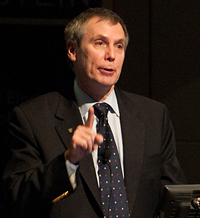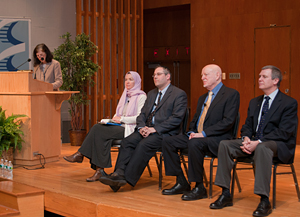

Insights Into End of Life
Symposium Offers Insights into Addressing Patient's Spiritual & Religious Needs
Physicians often face ethical and personal dilemmas in determining how to best address a variety of end-of-life issues. And while medical school curriculum generally touches upon these topics with students, there is a dearth of discussion of the role that religion or spirituality can play when decisions are made. "The Role of the Physician in Addressing Patients' Spiritual and Religious Needs in End-of-Life Decision-Making," a symposium co-sponsored by the Arnold P. Gold Foundation and Einstein sought to put these related issues into perspective for medical students who had been invited from throughout the greater metropolitan New York area.
"When we try to help patients with their decisions at the end of life from a bioethical perspective, we always try to understand the views and values of the patients and their families," said Dr. Elizabeth Kitsis, director of bioethics education at Einstein. "The aim of the symposium was to make students aware of the importance of inquiring about the role of spirituality and religion in their patients' lives, to learn how to ask about it and to have a basic understanding of some of the tenets and rituals of the major religions at the end of life."

Dr. Sulmasy reminded students, "M.D. doesn’t stand for 'medical deity.'"Because medical technology can sometimes make the process of dying ambiguous and its timing uncertain, providing optimal care now requires an understanding of the patient that goes well beyond his or her physical condition. Dr. Daniel P. Sulmasy, Kilbride-Clinton Professor of Medicine and Ethics at the University of Chicago, discussed this and other factors during his keynote address, "Spiritual Issues in the Care of the Dying."
"The spiritual needs of patients are often ignored because they are beyond the normal categories of medical responses," he told the audience of more than 200, which included students from Einstein, Mount Sinai School of Medicine and Columbia College of Physicians and Surgeons. "Although surveys show that a majority of patients want to be asked about their beliefs, this rarely happens. Discerning the most ethical choice is difficult when death is imminent and a patient's desires are not known, which is why end-of-life goals should be discussed in advance."
Dr. Sulmasy also noted, "You need to be comfortable with your own limitations. 'M.D.' doesn't stand for 'medical deity'." He suggested that students seek clues, such as the Qur'an or rosary beads visible on the bedside table, which can provide an opening for discourse.
Next, Mimi McEvoy, co-director of the Introduction to Clinical Medicine (ICM) course at Einstein, moderated a panel of religious experts who discussed perspectives on death and dying according to Islam, Judaism, Buddhism and Catholicism.
To begin, Dr. Ingrid Mattson, director of the MacDonald Center for the Study of Islam and Christian-Muslim Relations at the Hartford Seminary, explained, "Death to Muslims has a purpose. It was created by God and gives a deadline by which one can improve as a person and do good deeds.
"But we don't know when that deadline will be," she continued. "Therefore, a serious illness can bring a lot of stress, since the patient may feel they haven't done enough."

Mimi McEvoy introduces the panelists, from left, Dr. Mattson, Dr. Reichman, Rev. Lokos and Dr. SulmasyShe added, "It can be a time of both hope and fear. While suicide and euthanasia are forbidden, compassionate measures are acceptable, although there can be disagreement about nuance concerning some aspects of this."
In presenting the Jewish perspective, Dr. Edward Reichman noted some parallels that Judaism shares with Islam, including views on organ transplantation and autopsies, and the occasion for diverging opinions around end-of-life issues. "There is sensitivity to quality of life, even though life is valued above all," said Dr. Reichman who is both a physician on faculty at Einstein and a rabbi. "As with Islam, organ donation can be acceptable when it is done to save or extend a life."
Next, Reverend Allan Lokos talked about Buddhism, which he noted "is not classically a religion." He explained, "Buddha means awakened being. One can be a Buddhist practitioner and a follower of a religion."
He continued, "To a Buddhist, the cause of death is birth. Life and death can only happen in the moment, and a Buddhist will likely shun medication to be in the moment, unless pain relief is needed."
He concluded, "The greatest gift you can give a patient is to be present with them and be a good listener. If you want to comfort a patient who is dying, you must first be comfortable with your own mortality."
Rounding out the panel presentations, Dr. Sulmasy offered insights into Catholicism, noting "Scripture, ritual and tradition are a big part of Catholicism and this differs from other Christian faiths. We have a firm belief in the difference between killing and allowing someone to die. The belief in afterlife is very important, as is the need to see a priest before we die."
A question-and-answer session concluded the symposium, followed by round-table discussions where the students could engage panelists in a more informal setting. For Einstein students, the event complemented their ICM and Bioethics courses, which aim to develop their ability to provide compassionate as well as technically skilled medical care. And for visiting students, the event addressed important issues and concerns around religion and spirituality as well.
"It was exciting to see such a diverse group of panelists in a dialogue," said one second-year Einstein student, whose class was required to attend the symposium. "I had no idea that so many patients wanted to be asked about their religious beliefs, or how rarely that actually happens. This makes me more likely to do it when I practice medicine."
A student from Columbia concurred, "I especially appreciated learning how to ask these questions of patients, since that can be very difficult. This definitely affects how I will deal with patients."
"The presentations and questions from students demonstrate that this is an area we need to address further," said Ms. McEvoy. And Einstein will, since the College of Medicine plans to make the symposium an annual event, open to medical students from throughout New York City, Westchester and Long Island.
Photo Gallery
(To view slideshow of gallery, click on an image below; then move your mouse over the left or right margins to navigate.)
Posted on: Wednesday, January 25, 2012







Tablet Blog